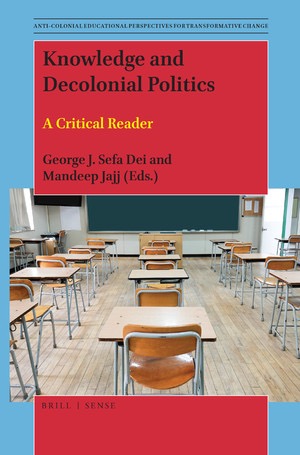
Knowledge and Decolonial Politics: A Critical Reader
Date Reviewed: April 15, 2019
Decolonization as an epistemological framework remains a pressing topic. Decolonization challenges the insidious ways in which colonialist ideologies persist as neo-colonial manifestations in economic, political, military, judicial, educational, and spiritual spheres, among others.
The series of essays in Knowledge and Decolonial Politics address different challenges within the educational system in Canada. The goal of the book is to address “intellectual colonialism” by decentering Western hegemonic ontology, epistemology, rhetoric, and policies (4-6). As the introduction claims, the “book intends to expose and challenge Western knowledge systems, and dominant political systems, and their role in subjugating, marginalizing, and oppressing local and Indigenous knowledges” (4).
After the introduction, the remaining seven chapters each consider a separate issue in need of decolonization with regard to pedagogy: dismissiveness of indigeneity in the curriculum, the classroom, rhetoric of “development,” land ethics, spirituality, spirit-body unity, and indigenous languages. Each of the chapters addresses a topic that is essential to the experience in the classroom, and which requires critical reflection from both teachers and students. As an edited work, the interconnectedness of the chapters sets up a promising framework.
The authors point out major weaknesses in the Canadian educational system which fail to prepare teachers and students to engage anti-discriminatory and anti-racist discourses and pedagogies. Despite the legal advancements and robust rhetoric in official documents, much remains to be implemented inside the classroom. The essays call for integrating various ways of knowing that are attentive to non-western cultures in order to challenge meaningfully the Eurocentricity of the curriculum.
It would have been beneficial throughout the essays to include specific references to actual indigenous communities and values. Many of the indigenous values mentioned remained in the abstract. Interesting points of contact with African indigenous values were raised in a few of the essays, but were underdeveloped (chapters four, six and eight).
Wambui Karanja’s chapter on western-based international intellectual property laws is the strongest and most compelling. The essay challenges current legal frameworks applied to land protection or conservation. It delves deeply into existing international protections for different communities. Karanja explores new possibilities that center indigenous communities and value traditional non-western wisdoms in order to develop a decolonizing framework for collaboration on indigenous land rights issues and knowledge production.
Overall, the essays raise important questions for decolonizing the curriculum. The topic of student assessment could have complemented the overall mission of the authors. Nevertheless, the authors demonstrate a deep knowledge of the colonial mindset persisting in neocolonial rhetoric and practices within institutions that claim a liberal concern for marginalized communities and alternate modes of learning. Educational institutions and overseers continually return to practices that re-inscribe colonial settler values through curricular values, status quo teaching strategies, language exclusivity, and the spirit/body dichotomy. While the essays do not recommend many concrete decolonializing strategies, they provide initial reflections on critical topics by naming the colonial injustices embedded in current educational practices, which can stimulate readers to develop further crucial insights identified by the authors.